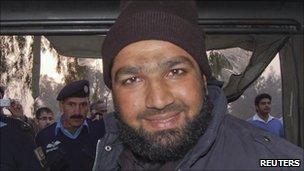Mumtaz Qadri admits killing Governor Salman Taseer
- Published

Malik Mumtaz Hussein Qadri has become a hero to many in Pakistan
The bodyguard accused of shooting Pakistani governor Salman Taseer has confessed in court to the killing.
Malik Mumtaz Hussein Qadri, 26, told the Anti-Terrorism Court in Rawalpindi that he had acted alone in the attack.
The hearing came as the Pope called for the repeal of Pakistan's blasphemy law; Mr Taseer's support for changes to the law was blamed for his assassination.
Meanwhile the killer's brother has told the BBC that his family had nothing to do with the murder.
"He never told us what he planned to do," Dilpazeer Awan told the BBC.
"It was his personal act, so I cannot comment on whether he did right or wrong."
Mr Awan, along with his father and four other brothers, was picked up by the police for interrogation soon after the governor's assassination. All have now been released.
"The police were mainly interested in finding out whether my brother was associated with any religious or political group. I told them none of our family has ever had any links with such organisations."
Mr Awan told police that his brother - who is known by his religious surname of Qadri - did have religious leanings and often attended religious gatherings.
After last Tuesday's assassination in Islamabad, Qadri said he had been angered by Mr Taseer's backing for proposed amendments to the blasphemy laws - under which a Christian woman faces the death sentence.
There has been speculation that other guards in the governor's security detail agreed with Qadri they would turn a blind eye to the attack.
'Acts of injustice'
Qadri was whisked into court on Monday morning, a day earlier than scheduled, to prevent his supporters showing up, correspondents say. He said in a written statement he had acted alone.
At his first court appearance in Islamabad last week, he was showered with rose petals by sympathisers, including a number of lawyers.
The blasphemy law returned to the spotlight in November when Asia Bibi was sentenced to death for allegedly insulting the Prophet Muhammad. She denies the charge.
Pope Benedict XVI - who has led calls for mercy to be shown to the mother of five - urged Pakistan on Monday to scrap the law, saying it was a pretext for "acts of injustice and violence".
"I once more encourage the leaders of that country to take the necessary steps to abrogate that law," he said in a speech to ambassadors accredited to the Vatican, reports AFP news agency.
"The tragic murder of the governor of Punjab shows the urgent need to make progress in this direction."
Governor Taseer had angered hardline clerics by visiting Asia Bibi in jail, and by supporting proposed reforms to the legislation.
A private member's bill which seeks to remove the law's mandatory death sentence and lessen the likelihood of miscarriages of justice has provoked a wave of conservative fury.
In a news conference on Sunday evening, Prime Minister Yousuf Raza Gilani reiterated the government did not plan to amend the law.
But Minority Affairs Minister Shahbaz Bhatti said the blasphemy law should be amended to avoid its misuse.
Earlier that day 50,000 protesters marched in the southern city of Karachi against the proposed reforms.
The rally was attended by all major Muslim groups and sects in the city, including moderates and conservatives.
Many of the demonstrators held banners in support of Qadri.
Critics say the blasphemy law has been used to persecute minority faiths in Pakistan and is exploited by people with personal grudges.
Although no-one convicted under it has ever been executed, more than 30 accused have been killed by lynch mobs.
- Published5 January 2011
- Published4 January 2011
- Published6 January 2011
- Published7 December 2010
- Published17 November 2010